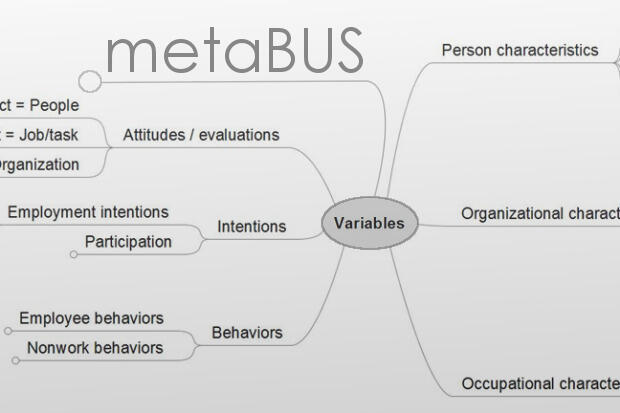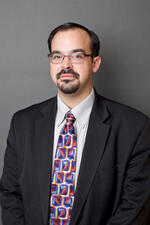
Aug. 25, 2014
Professor spreads the science of human resources to real-world managers
Share this story

Scientific findings are curated and communicated to the public less efficiently than crockpots, says Frank Bosco, Ph.D.
You can go on Amazon.com, search for a slow cooker, and easily limit search results based on brand name and the price you want. Or liquid capacity and customer reviews. Or any combination of the above. But say you’re a human resources manager who, in hopes of reducing employee turnover, is seeking information on the determinants of turnover — pay level, supervisor satisfaction and the like. The most ambitious manager might seek out a published review of the academic literature or even go through every management journal trying to find every paper that reports relevant findings. It could take years.
But, Bosco points out, most HR practitioners don’t read the scientific reports containing important findings from their field, let alone systematically peruse them in search of specific studies.
“The sad thing is that people who practice human resource management — HR practitioners — don’t know what HR scientists study or what such findings include,” said Bosco, assistant professor of management in the Virginia Commonwealth University School of Business, who specializes in human resource management and organizational research methods. “It’s called the scientist–practitioner gap, and it’s especially problematic in a field like HR because HR practices can have a major impact on individual and community well-being.”
Even reports published in outlets such as Academy of Management Perspectives, which aim to bridge that gap, seem to have little noticeable impact, according to Bosco. The communication breakdown exists because scientists and practitioners speak different languages, signaling a dire need of a Rosetta Stone.
Big data is the new trend. But metaBUS’ aim is not big data, per se — rather, it’s about the public understanding of science.
Bosco hopes to narrow the science–practice gap with a mapping tool called metaBUS.
Bosco launched the project in the summer of 2011 under the name OPERATION CODEFIELD. He was later joined by Krista Uggerslev, Ph.D., with the Northern Alberta Institute of Technology in Edmonton, Canada, and Piers Steel, Ph.D., of the University of Calgary in Calgary, Canada. Today, the three metaBUS founders seek to compile a database containing all of the research findings in the HR management field. The founders envision it as a field-level meta-analytic utopia, kept up-to-date and available for all researchers and practicing managers.
The approach involves the semi-automated extraction and classification of millions of research findings from several journals in the fields of human resource management and applied psychology and linking them to an interactive “map” — a comprehensive taxonomy of HR topics. By making these data readily available, metaBUS enables virtually anyone to navigate the map and answer questions in real-time.
Since its inception, metaBUS has received numerous rounds of funding, most recently a $140,000 grant from the Society for Human Resource Management (representing the second-largest SHRM Foundation grant since 1996) and a $123,000 National Science Foundation grant. With other funding sources, the project has generated $495,881 in research support in the last year.
The original OPERATION CODEFIELD database comprised 150,000 findings from 1980 to 2010 and included every study published in two of the industry’s top journals — Journal of Applied Psychology and Personnel Psychology. With the latest funding, the group was able to recruit a team of about 20 to contribute to the project and database, which now contains about 450,000 findings. The target is 1.2 million by July 31, 2016.
“We’ve got our work cut out for us,” Bosco said. “The beauty is, once you have a database that large and well-curated, one can essentially hold an entire research discipline in one’s hands, look at it from different angles, slice it and dice it along any chosen axis, and answer ‘big science’ questions in an instant.” Answers could actually make sense to people and be a few mouse clicks away, and that’s the way it should be — like crockpots on Amazon.com.
Because the data is classified in a way that’s easy to understand, the user’s level of expertise or experience doesn’t matter.

“From a practitioner's perspective,” said VCU doctoral student Jamie Field, the coding supervisor on the project, “someone might just be curious. They could say, ‘You know I’m having this issue in my workplace, what does the science tell me?’ and they could access the database, put in their relationship of interest and view the findings — the relationship between pay level and employee turnover, for example.”
In essence, Field said, the project represents a search engine for organization behavior and human resource management research findings that people can search with ease using layperson terms.
“In an instant, they can search our database and find all previously published findings,” he said. “It would become what we call ‘instant meta-analysis,’ an all-encompassing, aerial view of our field. It’s the next step. Big data is the new trend. But metaBUS’ aim is not big data, per se — rather, it’s about the public understanding of science.
“[But] what use is data unless it’s smart data?”
And that’s where metaBUS shines: by including an interactive map of the field and everyday phrases such as ‘how you feel about your boss,’ the translated findings come to life and result in information that is ‘smart’ and fundamentally useful and understandable to a general audience.
For instance, there’s a common misconception in the field that people leave their jobs because they’re not paid enough, Field said.
“Whereas, if you actually look at the data, a lot of times people leave because they’re not satisfied with their supervisors,” he said. “They leave because of the people they work with. There’s virtually no limit on the types of questions that can be asked — we aim to open the floodgates of science for the masses so that we can finally make sense to others.”
Always looking to improve the database, and thanks to a grant from the SHRM Foundation, Bosco and his colleagues are working with practicing HR managers to build a map of terms used by practitioners.
“We will then link their terms to those used by HR scientists — a true leap in bridging the science-practice gap and, perhaps, the Rosetta Stone we’ve been looking for,” he said. In terms of community outreach, Bosco plans to raise interest among HR managers in the Richmond area who are willing to contribute to the ‘big science’ effort, learn a great deal about the science of HR and, hopefully, have a positive and lasting impact on local business.
Subscribe for free to the weekly VCU News email newsletter at http://newsletter.news.vcu.
Subscribe to VCU News
Subscribe to VCU News at newsletter.vcu.edu and receive a selection of stories, videos, photos, news clips and event listings in your inbox.









